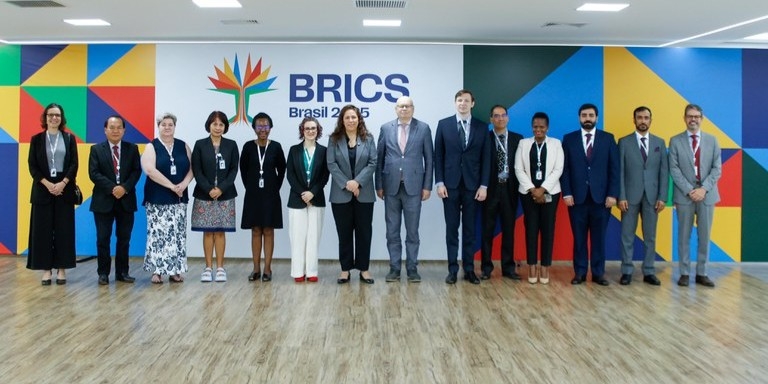BRICS seminar discusses future of cooperation in sustainable public procurement
Representatives from member countries discussed strategies to promote the exchange of experiences and expand international cooperation around the strategic use of public procurement for sustainable development

By MGI | Brazilian Ministry of Management and Innovation in Public Services
The in-person BRICS Seminar on Sustainable Public Procurement, held this Tuesday (May 27) in Brasilia, centered on discussions about cooperation in sustainable public procurement. The event, organized by the Ministry of Management and Innovation in Public Services under the auspices of Brasil’s 2025 BRICS presidency, brought together representatives from member states to foster the exchange of experiences and strengthen international cooperation around the strategic use of public procurement to drive sustainable development. The morning session was led by Esther Dweck, Minister of Management and Innovation in Public Services.
Opening the discussions, the minister underscored the purpose of the meeting, which frames public procurement as a driver of economic development. “Since the beginning of our presidency, the aim of this seminar has been to promote a technical and substantive dialogue among countries that, while following different paths and systems, share a common interest in using the State’s purchasing power as a tool for transformation. Sustainability and innovation are not empty words—they are being embedded in regulations, electronic systems, procurement criteria, and political decisions, aligning State action with social and environmental demands.”
Dweck also underscored the relevance of the event to the shared agenda of participating countries. “The shared experiences reinforce the importance of international cooperation in advancing more sustainable and innovative public policies that respond to today’s challenges and strengthen the strategic role of the State.”
Among the multilateral institutions in attendance, the New Development Bank (NDB) contributed with perspectives focused on infrastructure and innovation initiatives.

Representing the bank, Anand Kumar Srivastava emphasized that while each country faces distinct challenges, they share a common goal: “To promote public procurement systems that are more sustainable, efficient, and aligned with the social and environmental needs of our populations. In our case, we’ve been advancing projects with medium- and long-term targets, including plans extending to 2050 and 2060, aimed at developing green infrastructure and urban modernization,” he said. Srivastava also highlighted NDB’s efforts in creating digital platforms and solutions that promote equity, innovation, and transparency.
In a presentation on industrial development policies, Natasha Galotta, manager at the Brazilian Development Bank (BNDES), emphasized the role of public procurement as a tool to promote domestic production. “BNDES is more than a financier—it is a public policy instrument. Our role includes supporting large-scale projects and strengthening the national industry, including through local content policies and incentives for micro, small, and medium-sized enterprises. These initiatives align directly with the public procurement agenda, which has the potential to boost the country’s economic and social development,” she explained.
According to her, coordinated initiatives between government and industry have helped increase the participation of Brazilian companies in major government purchases, particularly in strategic sectors. “We began supporting public procurement and financing precisely through these development-oriented plans. We have solid experience in measuring local content in machinery and equipment, with methodologies that guide the inclusion of national production in government acquisitions. The goal is to create jobs, strengthen industry, and bring new technologies into the country,” she added.
Training public servants as a foundation for change
Natália Teles da Mota, Executive Director of the National School of Public Administration (Enap), also took part in the discussions and highlighted the strategic role the institution plays in training and qualifying public servants in Brasil. “In 2024, we certified over 1.8 million individuals in online, in-person, and hybrid courses. Our catalog includes more than 800 open and free courses in Portuguese, English, and Spanish, and we currently have more than 9,000 international students on our virtual platform. These numbers reflect our commitment to building public sector capacity across various fields, including public procurement, innovation, and sustainability.”
Addressing the main challenges in implementing sustainable procurement policies, she emphasized the need for cultural change within the public sector. “A policy only becomes real when it is put into practice on a daily basis. We need to support those on the front lines so this transformation can happen effectively.”
International experiences
Mendoe Ntswahlan, representing South Africa’s National Treasury, emphasized the strategic relevance of public procurement by combining two central functions: economic and social. According to her, this dual role turns the public sector into a true engine of transformation. “Public procurement involves two essential aspects: the process of acquiring goods and services by public authorities, and a strong requirement that these purchases contribute to sustainable development. When we combine these two factors—the economic function and the social function—we are able to transform the public sector into a driver of change. In South Africa, we use government procurement as a constitutional tool for economic inclusion. It’s not just a legal norm—it is embedded in our Constitution. It is one of the highest expressions of public interest and is directly tied to our broader socioeconomic priorities.”
"Public procurement involves two essential aspects: the process of acquiring goods and services by public authorities, and a strong requirement that these purchases contribute to sustainable development. When we combine these two factors—the economic function and the social function—we are able to transform the public sector into a driver of change"
She also drew attention to the economic weight of government procurement and its potential impact on the private sector and employment. “In South Africa, public procurement currently accounts for 16.5% of GDP. This shows how much the public sector can influence the economy by prioritizing sustainable goods and services, as well as green infrastructure. When procurement is guided by these criteria, it can boost private sector activity, generate jobs, and transform entire production chains. This is a real area of development—especially crucial in countries where unemployment remains a major challenge.”
Representing Uganda, Mercy Agaba Kyoshabire emphasized the central role of public procurement in the country’s budget management, noting that most national resources are channeled through this mechanism. “Our national budget for this fiscal year is approximately 22.1 trillion, and between 60% to 70% of that is executed through public procurement. This shows how strategic the procurement sector is to the country. Our legislation sets out fundamental principles such as non-discrimination—based on gender, religion, or any other criterion—and maximizing competition. Even when direct contracting is allowed, the supplier must be selected from a pre-qualified list. The goal is always to ensure the best value for public money. We have a standardized system across all institutions, with regulations that guide planning, requests, document preparation, evaluation criteria, and contract management. All of this must incorporate sustainability at every stage of the process.”
Aleksei Lavrov, Deputy Minister of Finance of Russia, spoke about BRICS countries’ efforts to modernize public procurement with a focus on efficiency and oversight. “We are discussing procedures, digital technologies, and control mechanisms to ensure we are truly achieving the goals set out in our procurement policies. Each country has its own approach, but it’s clear there is a shared effort to enhance transparency, traceability, and efficiency in government procurement.”
On the economic relevance and coordination across government levels, he noted that public procurement represents a significant share of the GDP, highlighting how strategic the sector is for any country. “In countries with a federative structure, like Russia, regional and local authorities have a degree of autonomy, but they all operate within the same federal framework. This coordination is essential to ensure that principles of efficiency, equity, and transparency are upheld across the entire territory.”
Next steps and the legacy of the Brazilian presidency
At the close of the seminar, participating countries highlighted the importance of keeping sustainable public procurement on the international agenda. As part of the follow-up actions, the Brazilian presidency is drafting a paragraph about the event to be included in the final BRICS declaration, recognizing the discussions held and signaling support for maintaining the topic within the group.
In addition, a Final Report will be produced, compiling the main insights, experiences, and proposals shared during the event. The document will be circulated to the delegations for comments before the final version is completed and may serve as a basis for future decisions within BRICS—leaving a meaningful legacy from the Brazilian presidency to its successor, India.
For Rodrigo Estrela, head of the Special Advisory Office for International Affairs at the Ministry of Management and Innovation in Public Services, the seminar demonstrated the value of exchange among BRICS countries. “This seminar experience was very meaningful. The diversity of BRICS countries shows us different paths and solutions to similar problems. Sharing these approaches is essential, because we face common challenges in our public procurement systems. What matters is understanding that there is no one-size-fits-all model. We create systems tailored to solve local problems, respecting our regional contexts. I call this a collective construction of solutions. Over the three sessions, it became clear that there is much to learn and adapt. It was a unique opportunity for exchange, allowing us to move forward with greater intelligence and collaboration.”
In that same spirit of cooperation, India’s representative also emphasized the collective recognition of the seminar’s importance. “Regardless of the format it may take moving forward, the value of this seminar over the past few months was evident, as was the shared interest in keeping this strategic agenda alive. We remain fully committed to supporting continued dialogue and cooperation.”
English version: Judas Tadeu de A. Neto (UFC/POET)
Proofreading: Michel Emmanuel F. François (UFC/POET)